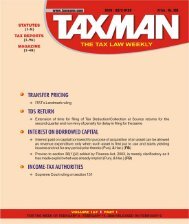news round up - Taxmann
news round up - Taxmann
news round up - Taxmann
- TAGS
- news
- round
- taxmann
- taxmann.com
Create successful ePaper yourself
Turn your PDF publications into a flip-book with our unique Google optimized e-Paper software.
2010] Comments of DoR on First Discussion Paper on GST 139<br />
1 2 3 4<br />
21. 3.9 Special Industrial Area Scheme : After the<br />
introduction of GST, the tax exemptions, remissions<br />
etc. related to industrial incentives<br />
and special industrial area schemes should be<br />
converted, if at all needed, into cash refund or<br />
subsidy schemes after collection of tax, so<br />
that the GST scheme on the basis of a continuous<br />
chain of set-offs is not disturbed. Regarding<br />
Special Industrial Area Schemes, it is<br />
clarified that the benefits of such exemptions,<br />
remissions etc. would continue <strong>up</strong> to legitimate<br />
expiry time both for the Centre and the<br />
States. Any new exemption, remission etc. or<br />
continuation of earlier exemption, remission<br />
etc. would not be allowed. In such cases, the<br />
Central and the State Governments could<br />
provide reimbursement after collecting GST.<br />
22. 3.10 IT Infrastructure : After acceptance of IGST<br />
Model for Inter-State transactions, the major<br />
responsibilities of IT infrastructural requirement<br />
will be shared by the Central Government<br />
through the use of its own IT infrastructure<br />
facility. The issues of tying <strong>up</strong> the State<br />
Infrastructure facilities with the Central facilities<br />
as well as further improvement of the<br />
States’ own IT infrastructure, including<br />
TINXSYS, is now to be addressed expeditiously<br />
and in a time bound manner.<br />
23. 3.11 Constitutional amendments, legislations and<br />
rules for administration of CGST and SGST :<br />
It is essential to have Constitutional Amendments<br />
for empowering the States for levy of<br />
service tax, GST on imports and consequential<br />
issues as well as corresponding Central<br />
and State legislations with associated rules<br />
and procedures. With these specific tasks in<br />
view, a Joint Working Gro<strong>up</strong> has recently<br />
been constituted (September 30, 2009)<br />
comprising of the officials of the Central and<br />
State Governments to prepare, in a time bound<br />
manner a draft legislation for Constitutional<br />
Amendment, draft legislation for CGST, a<br />
suitable Model Legislation for SGST and rules<br />
and procedures for CGST and SGST. Simultaneous<br />
steps have also been initiated for drafting<br />
of a legislation for IGST and rules and<br />
procedures. As a part of this exercise, the<br />
Working Gro<strong>up</strong> may also address the issues<br />
of dispute resolution and advance ruling.<br />
Agreed.<br />
Agreed.<br />
The Joint Working<br />
Gro<strong>up</strong> (JWG) has<br />
held several meetings<br />
by now. Department<br />
of Revenue is closely<br />
working with Ministry<br />
of Law, Government<br />
of India, for<br />
finalisation of draft<br />
Constitutional amendment.<br />
The issue of<br />
empowering States<br />
to levy GST on imports<br />
has been deliberated<br />
by the JWG<br />
and the view which<br />
has emerged out of<br />
discussion is that the<br />
Centre shall collect<br />
GST on imports and<br />
pass on the SGST<br />
component of it to<br />
concerned State on<br />
destination principle.<br />
GOODS & SERVICES TAX CASES ❑ JANUARY 20 - FEBRUARY 4, 2010 ◆ 21











![“FORM NO. 3CEB [See rule 10E] Report from an ... - Taxmann](https://img.yumpu.com/45480232/1/190x245/form-no-3ceb-see-rule-10e-report-from-an-taxmann.jpg?quality=85)





